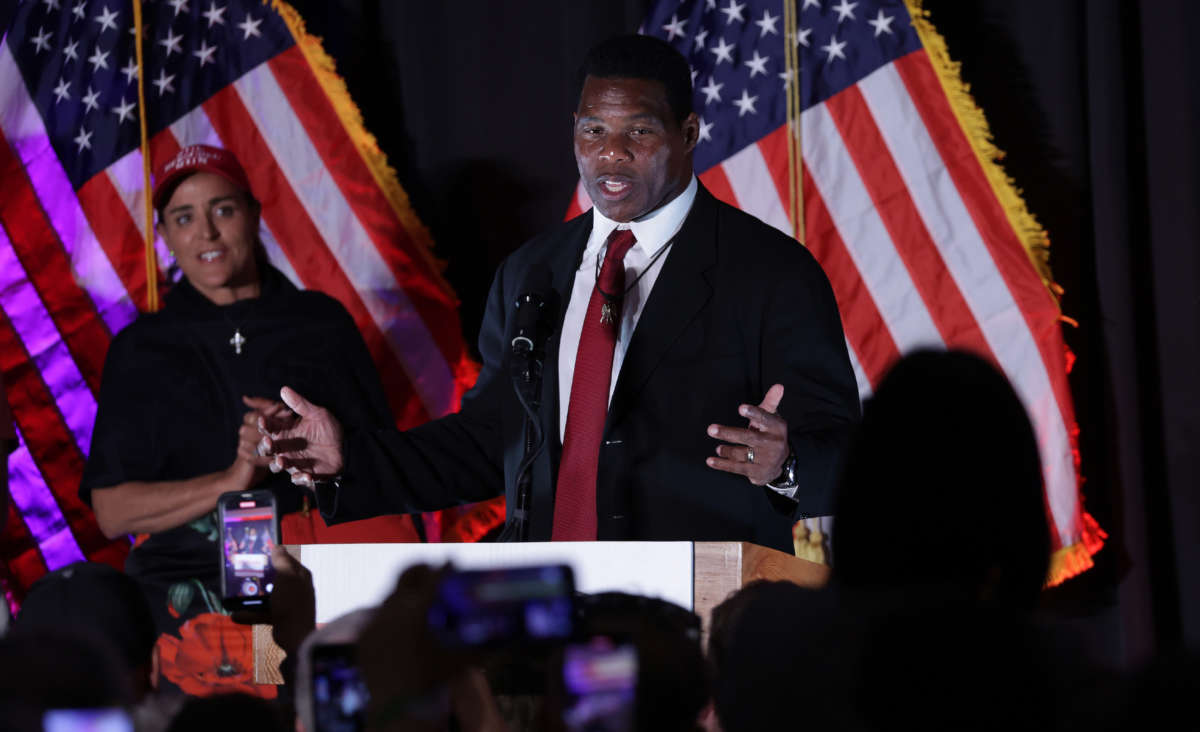Honest, paywall-free news is rare. Please support our boldly independent journalism with a donation of any size.
Herschel Walker, a Republican candidate for Georgia Senate, will likely face a challenging runoff contest against Democratic Sen. Raphael Warnock next month.
Although ballots are still being counted for the midterm election that took place earlier this week, it’s all but certain there will be a runoff election in order to determine Georgia’s senator for the next six years. As of Thursday morning, 49.42 percent of voters had cast ballots for Warnock, while 48.52 percent voted for Walker.
Georgia law requires candidates to attain greater than 50 percent of the vote in order to be elected. It’s highly unlikely that Warnock will secure the necessary number of votes needed to avoid a runoff election, which would be held in the first week of December.
Although the race was close in its first round, the runoff poses new challenges for Walker. As Axios has reported, Walker performed worse in Georgia’s elections than Republican Gov. Brian Kemp, who was reelected to his post on Tuesday.
According to the most recent numbers, 200,000 more Georgia residents voted for Kemp than for Walker. It’s possible that a significant portion of the voters who backed Walker only did so because he appeared on a ballot alongside Kemp — meaning that Walker will need to motivate those voters to return to the ballot box in a month’s time, which could prove difficult since only him and Warnock will be on the ballot.
It will likely be easier for Warnock to win than Walker, as the Democrat ended up closer to the 50 percent threshold.
The race could potentially be complicated by an announcement from former President Donald Trump that he will be running for president in 2024. That announcement, which will likely be happening next week, could distract from Walker’s efforts to energize his base for the runoff race. It could also divert much-needed fundraising dollars away from Walker, as many of his supporters would likely donate to Trump’s presidential campaign.
Trump’s involvement in Walker’s campaign is also a double-edged sword. If Trump comes to Georgia to campaign with Walker, who has gotten the former president’s endorsement before, it could alienate moderate voters. But if there are noticeable efforts by Walker’s campaign to keep Trump away from Georgia, it could also anger Trump loyalists, who experts believe are critical in securing a Walker victory.
The Georgia runoff election has national implications, as it could affect the partisan balance of the U.S. Senate.
Ballots are still being counted in Nevada and Arizona, where Democratic senatorial incumbents are expected to win by very narrow margins. In Nevada, Republican Adam Laxalt is ahead of Sen. Catherine Cortez Masto (D) by just over 15,000 votes as of Thursday afternoon, but many experts believe that the remaining ballots will tip the race in Masto’s favor. If not, the Senate seat will flip from Democrat to Republican.
In the event that Masto loses, Democrats can only maintain control of the Senate if Warnock wins in Georgia, keeping the 50-50 split through Vice President Kamala Harris’s tie-breaking vote.
Holding Trump accountable for his illegal war on Iran
The devastating American and Israeli attacks have killed hundreds of Iranians, and the death toll continues to rise.
As independent media, what we do next matters a lot. It’s up to us to report the truth, demand accountability, and reckon with the consequences of U.S. militarism at this cataclysmic historical moment.
Trump may be an authoritarian, but he is not entirely invulnerable, nor are the elected officials who have given him pass after pass. We cannot let him believe for a second longer that he can get away with something this wildly illegal or recklessly dangerous without accountability.
We ask for your support as we carry out our media resistance to unchecked militarism. Please make a tax-deductible one-time or monthly donation to Truthout.
